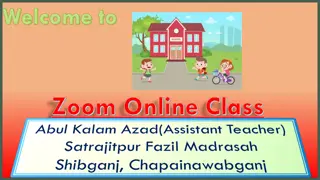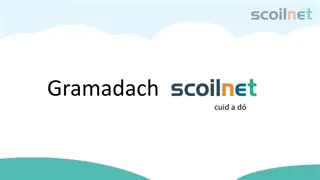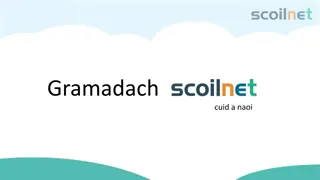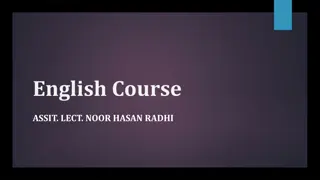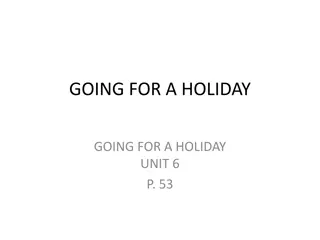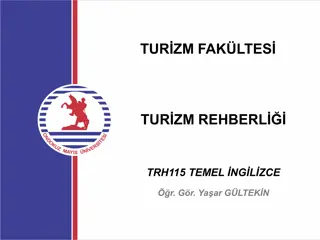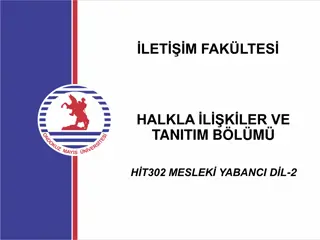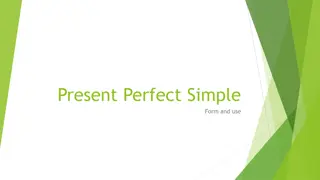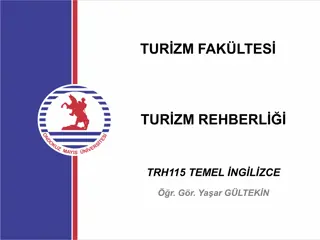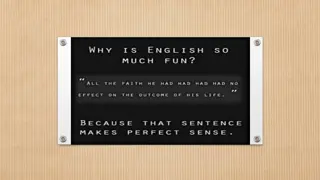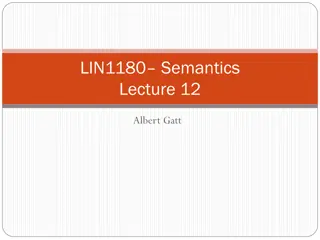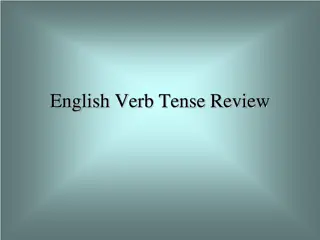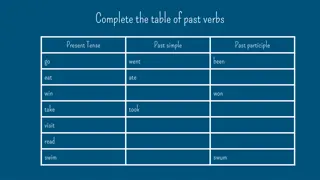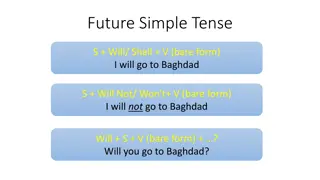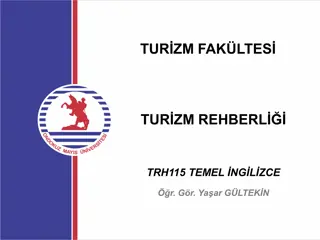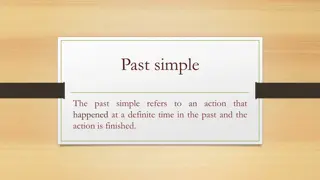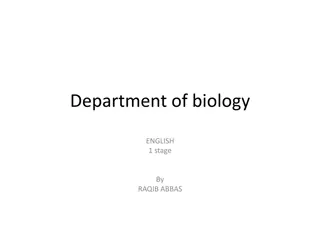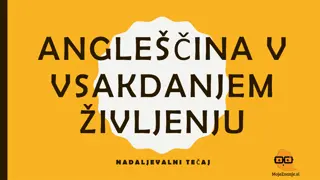Understanding Simple Past Tense in Grammar
In this file, we delve into the concept of simple past tense in grammar. Through examples and explanations, you will learn how to use the simple past tense to talk about completed actions in the past. The structure, usage, and importance of simple past tense are covered extensively to enhance your understanding of this fundamental grammatical concept.
Download Presentation

Please find below an Image/Link to download the presentation.
The content on the website is provided AS IS for your information and personal use only. It may not be sold, licensed, or shared on other websites without obtaining consent from the author. Download presentation by click this link. If you encounter any issues during the download, it is possible that the publisher has removed the file from their server.
E N D
Presentation Transcript
GOD PROSPECT 3 GRAMMAR SIMPLE PAST TENSE Teacher: Maryam Ansari Guilan
In this file we want to talk about simple past tense: : " . . " : . . " . . / : . "
: Mary is a teacher now. Mary was a student 2 years ago. We want a glass of water every 1 hour. We wanted a glass of water last night. Mike & Sara go to school 5 days of a week. They went to school yesterday.
When ; where & why do we use simple past tense? : Definition: The past indefinite tense, also known as simple past tense, is used to indicate a finished or completed action/task that occurred/happened at a specific point in time in the past. . . . " " The past simple is used : to talk about actions or processes that happened once or repeatedly in the past and that are completed (key words: yesterday, last month, last year, two weeks ago, in 1999 etc.): I bought a new car two months ago. Sabrina arrived in London very late last night.
Structure: : Subject + verb in the past form + . . . . . + adverb of time + . . . . . *** Regular verbs infinitive (base form) + ending -ed *** Irregular verbs special forms according to the list at the end of book Examples: Alex went to Mexico last year. I ate a mango a few minutes ago. He had an exam yesterday.
: we use it to tell the stories because we want to talk about past. we use it to show the actions that started and ended in the past. we use it to share information about our past events facts and habits in the past. actions finished in the past (single or repeated) I visited Berlin last week. Andrew watched TV yesterday. My friends went to Paris a week ago. My parents ate a lot of junk food when they were young. it can also be used for repeated action in the past; series of completed actions in the past First I got up, then I had breakfast. On Sunday my brother and I went to a nice lake. There we met our friends. We swam in the warm water and played volleyball in the afternoon. Too bad that we had to go home in the evening. We didn't want to go to school on Monday
: . 1 . * We went to Spain for our holidays . 2 .) ( . We swam a lot while we were on holiday . . She played a lot of tennis when she was younger. . * 3
Time markers: (key words in statements: yesterday, last month, last year, two weeks ago, in 1999 etc.):
What are the present & past tenses of to be verbs?
Past tense of to be verbs & its expressions:
: ed- . . . Regular verbs: a verb following the normal pattern of inflection. "the general rule is that regular verbs form the past tense by adding -ed" In English, the "usual" rule is to add - ed or -d to the base form of the verb to create the past forms. Irregular verbs: a verb that does not follow the normal pattern of inflection. "there are some differences in irregular verbs between British and American English" A verb in which the past tense is not formed by adding the usual - ed ending. Examples of irregular verbs are sing (past tense sang); feel (felt); and go (went). . . -ed -d
Spelling Rules for Creating the Past Forms of Regular Verbs: Add "ed" to most verbs: jump > jumped paint > painted If a verb of one syllable ends [consonant-vowel-consonant], double the final consonant and then add "ed": chat > chatted stop > stopped
If the verb ends [consonant + "y"], change the "y" to an "i" and add "ed" :cry > cried fry > fried If the verb ends "e," just add "d": thrive > thrived guzzle > guzzled If the final consonant is "w," "x," or "y," don't double it: sew > sewed fix > fixed If the verb ends in to one of the vowels( a /e / i / o / u )+ Y ; we do not change the "y" to an "i" and just add "ed : :play > played Stay > stayed
: *** Check the dictionary at the end of your book and try to memorize them*** ***. *** : . : Eat > ate Run > ran Buy > bought . *
1. Forming a negative Negatives in the simple past are formed by adding didn't (informal) or did not (formal) before the simple form of the verb. The verb BE is an exception to this; in the caseof BE, we just add n't (informal) or not (formal) after "was" or "were": Simple past statement Informal negative Formal negative I had a car. I didn't have a car. I did not have a car. You ate my toast. You didn't eat my toast. You did not eat my toast. He was here yesterday. He wasn't here yesterday. He was not here yesterday. They were in the park. They weren't in the park. They were not in the park.
2. Forming a yes/no question Yes/no questions are also created using the auxiliary did. This time, the auxiliary is placed before the subject. The verb BE is an exception; in this case, we move BE before the subject. Here are the rules: Simple past statement Yes/no question He brought his friend. Did he bring his friend? They had a party. Did they have a party? You were here. Were you here? She was sick. Was she sick?
3. Forming a WH- question WH- questions (using words such as "what", "when", and "where") are also created by putting the auxiliary did before the subject (or moving BE, as explained above). Then, you add the WH- word at the beginning. Here are some examples: Statement Yes/no question WH- question Why did the building fall down? The building fell down. Did the building fall down? They lived in Vancouver. Did they live in Vancouver? Where did they live? The store was closed. Was the store closed? Why was the store closed? They were wolves. Were they wolves? What were they?
Exercise: 1)try to fill in the blanks with appropriate form of verbs in simple past tense: One day I (swim) out to a small island . When I . (come) back to the beach I .(feel) tired so I went to sleep. Once, while I was half asleep I (think) I (hear) someone moving nearby but I . (can't) see anyone. I .(wake) up an hour later and guess what? I couldn't find my clothes anywhere. Someone had stolen them! My watch was gone too, and my purse. But I had only .(bring) a few dollars for drinks and snacks so I didn't lose much. I (run) to the village, which fortunately was just up the road, and . (buy) a towel at a beach shop to dry myself. Then I .(go back) to my sister's house. 2)*** NOW ask & answer some questions in group. 3)***complete your home work.




